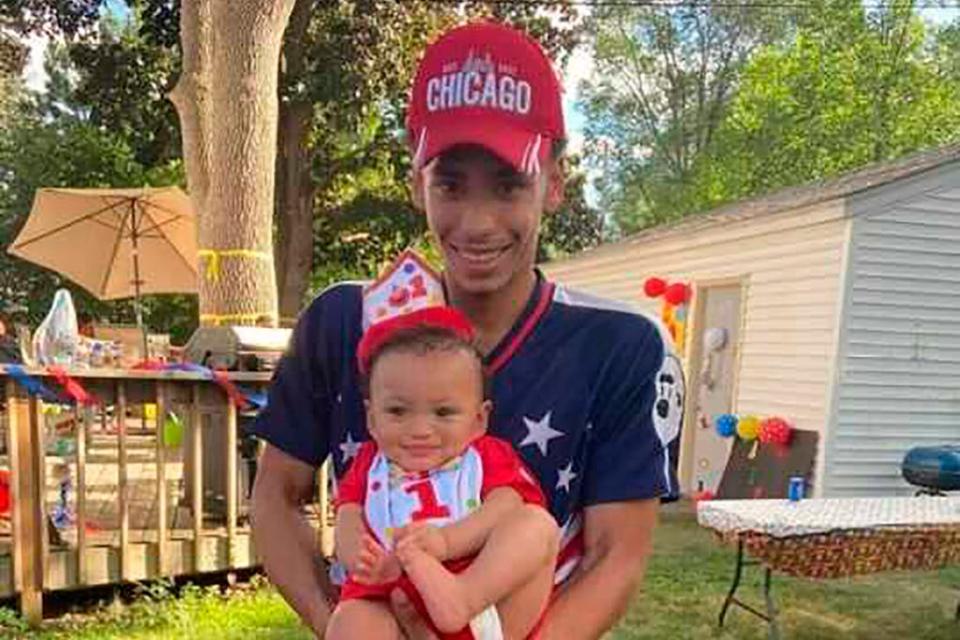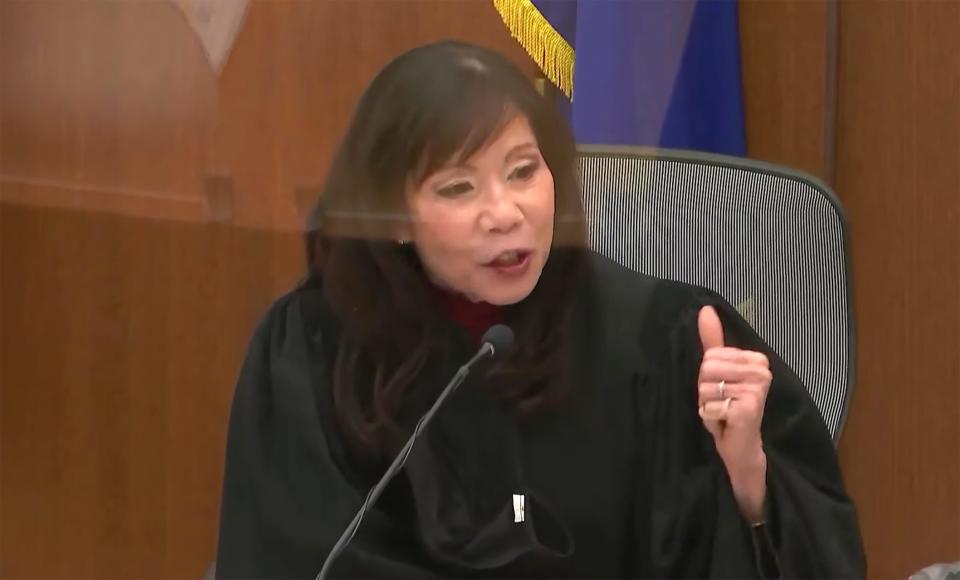Former Minnesota officer Kim Potter goes on trial for Daunte Wright shooting with 'wrong gun' defense
Four people were selected Tuesday on the first day of jury selection in the manslaughter trial of a former Minnesota police officer who fatally shot a Black man while yelling "Taser" during a traffic-stop-turned-arrest earlier this year.
The seated jurors include a white man in his 50s, a white woman in her 60s, a white man in his 20s and an Asian woman in her 40s, according to the court.
The panel will be charged with determining whether Kim Potter is guilty of first and second-degree manslaughter in the death of Daunte Wright, 20, on April 11 in the Minneapolis suburb of Brooklyn Center. Prosecutors say Potter, 49, was a veteran officer who recklessly handled her firearm and should have known better. Defense attorneys say she made an "innocent mistake," according to court filings.
The shooting happened just miles from the ongoing trial of Derek Chauvin, the former Minneapolis police officer who was ultimately convicted in the murder of George Floyd. Two days after the shooting, Potter and the police chief both resigned, amid protests and looting. Potter had been with the Brooklyn Center police for 26 years.
Hennepin County District Court Judge Regina Chu and attorneys for the prosecution and defense began questioning prospective jurors, first in groups and then individually. The court heard from 11 jurors, and the prosecution and the defense each exercised a peremptory strike, which allows them to dismiss a juror without stating a reason.
Several would-be jurors said they had strong opinions about Potter. One questioned how a "seasoned officer" could have mistaken a firearm for a Taser.
"If you’re about to get in a crash, you know the difference between the brake and the gas. And if you don’t know the difference between a Taser and … a pistol, I then question your judgment and your expertise," said the juror, who was excused.
One of Potter’s attorneys, Paul Engh, told a prospective juror that Potter would take the witness stand.
In a statement Tuesday, attorneys Ben Crump, Antonio Romanucci and Jeff Storms, who represent Wright's family, alleged the shooting was not an "innocent mistake."
"No reasonable officer can confuse their Taser for a gun, particularly a training officer who drew both of those weapons from her duty belt countless times," the attorneys said.
How could a gun be mistaken for a Taser? There have been at least 16 incidents of 'weapon confusion' since 2001

To convict on the charge of first-degree manslaughter, prosecutors must prove beyond a reasonable doubt that Potter caused Wright's death while committing the misdemeanor offense of reckless handling or use of a firearm.
For second-degree manslaughter, prosecutors must prove Potter consciously took a chance of causing death or great bodily harm to Wright. That charge requires prosecutors to prove "culpable negligence" – a conscious and disregard of a substantial and unjustifiable risk.
The first-degree manslaughter charge carries a maximum sentence of 15 years in prison and/or a $30,000 fine. The second-degree charge has a maximum sentence of 10 years and/or a $20,000 fine.
Opening statements for the trial, which will be livestreamed, are expected to begin Dec. 8. Judge Chu said she hopes the trial will wrap up "by Christmas Eve."
Bodycam video shows fatal Brooklyn Center police confrontation
According to the complaint, Potter, who is white, and another officer who she was training initially stopped Wright's car because it had an air freshener hanging from the rearview mirror and the tags were expired. After the officer determined Wright had an outstanding arrest warrant, Potter and two other officers attempted to arrest him.
Body camera video released shortly after Wright's death showed Wright followed officers' instructions to get out of the car and place his hands behind his back. As an officer was attempting to handcuff Wright, he pulled away and got back in the driver's seat.

"I’ll tase ya," Potter yelled as she removed her handgun and pointed it at Wright. She yelled, "I’ll tase you" and "Taser, Taser, Taser," before firing a shot into Wright's chest. According to the complaint, the bullet pierced a rib, both lungs and his heart.
"Ah, he shot me," Wright said before driving his car down the street and crashing into another vehicle.
Potter shouted several expletives and said she "grabbed the wrong" gun. "I shot him," she said. She added: "I’m going to go to prison" and "I killed a boy."
A woman who was in the car with Wright was taken to the hospital. Wright was pronounced dead at the scene. A medical examiner later found Wright died by homicide due to a gunshot wound.
Tim Gannon, the Brooklyn Center police chief who resigned, called the shooting an "accidental discharge."
Potter was arrested three days after the shooting and charged with second-degree manslaughter. Prosecutors filed the first-degree charge in September. Activists demanded a murder charge.
Lethal force? Tasers are meant to save lives, yet hundreds die after their use by police
Killing of Daunte Wright reignites tensions, prompts protests
Wright's death inflamed nationwide tensions over police violence amid the Chauvin trial, and protests and tributes to Wright cropped up across the country.
In Brooklyn Center, hundreds of people gathered nightly at the police station, where police and the Minnesota National Guard responded with riot gear, rubber bullets and tear gas. Businesses were looted, and the governor declared a curfew in several counties. Dozens of people were arrested.
One night, journalists covering the protests were rounded up by law enforcement, forced onto their stomachs and released only after having their face and press credentials photographed.
President Joe Biden called the shooting "a really tragic thing" and said he watched the "fairly graphic" bodycam video. White House press secretary Jen Psaki said the shooting was "a reminder of the pain, the anger, the trauma, the exhaustion that many communities across the country have felt as we see these incidents continue to occur."
Wright's mother, Katie Wright, described her son as a family man who enjoyed celebrating the Fourth of July. He loved to goof around, play sports and dote on his namesake 2-year-old son, Daunte Jr., she said. He planned to get his GED. Wright said her son called her as he was getting pulled over.
"He was so much more, and he did not deserve this. My heart is literally broken into a thousand pieces," Wright told reporters at a vigil two days after her son's death.
The Rev. Al Sharpton delivered Wright's eulogy at the end of April. Minnesota Gov. Tim Walz, Sen. Amy Klobuchar, Sen. Tina Smith, Rep. Ilhan Omar, Minnesota Attorney General Keith Ellison and Floyd's family members attended Wright's funeral.
'He was loved by so many': Daunte Wright remembered at a funeral packed with mourners

Kim Potter had 'substantial amount of training' on Tasers, prosecutors say
During her time on the force, Potter was a union leader and instructor. She was named president of the Brooklyn Center Police Officers Association in 2019.
Potter had received "a substantial amount of training" related to use of force, according to the complaint. She completed annual recertification training courses on firearms and Tasers and, in the six months leading up to the incident, completed two Taser-specific training courses.
Potter's Taser looked and felt different from her handgun, the complaint said. While her Taser was yellow with a black grip, her handgun was entirely black. The texture of the handgun has a "distinct grip," and the Taser has a safety switch that must be disengaged before it can be fired, according to the complaint.
Adam Toledo, Daunte Wright, George Floyd: Would more de-escalation training stop police from killing people?
An investigation after the shooting by USA TODAY and the Arnolt Center for Investigative Journalism at Indiana University found that Tasers have been involved in hundreds of deaths and injuries in the past decade because of substandard or inconsistent training for law enforcement.
There have been at least 15 other cases of "weapons confusion" in the U.S. since 2001, and Wright is the fourth person to have died in such incidents, according to data compiled by the website FatalEncounters.org and University of Colorado professor Paul Taylor.
Jurors questioned about Black Lives Matter, Blue Lives Matter
Given the high-profile nature of the killing, attorneys were carefully questioning prospective jurors about their prior knowledge of the case and their opinions on a range of topics.
Prospective jurors received a 15-page questionnaire from the court asking about their background, media habits, and views of law enforcement and the criminal justice system. The questionnaire asked about their views of Potter and Wright and whether they participated in or had property damage from any demonstrations in the last two years.
Similar questionnaires were used in the jury selection processes for the widely viewed trials of Chauvin and the three men convicted this month of Ahmaud Arbery's murder in Georgia.
In individual questioning, attorneys asked would-be jurors to expand on their responses to the form, prompting discussions about Black Lives Matter, Blue Lives Matter, "defund the police" and more.
"We had a very emotional year in Minneapolis," one prospective juror told the court.

Minnesota Attorney General Keith Ellison is prosecuting the case. Potter is being represented by attorneys Earl Gray and Engh. Gray also represents a former Minneapolis police officer charged in the death of George Floyd and previously represented an officer who fatally shot Philando Castile during a traffic stop outside St. Paul.
Judge Chu initially said she would not allow recording or livestreaming of the trial but then reversed the decision earlier this month, citing the COVID-19 pandemic. Chu's reversal came three days after demonstrators protested the decision outside what they believed was her home, according to local news outlets.
Minnesota allowed cameras inside the courtroom to broadcast a criminal trial for the first time earlier this year, for the Chauvin trial.
The courthouse will not be surrounded by a fence, as it was for the Chauvin trial, court officials said. But there will be enhanced security measures.
This article originally appeared on USA TODAY: Kim Potter goes on trial in Daunte Wright fatal shooting: What we know

 Yahoo Movies
Yahoo Movies 
